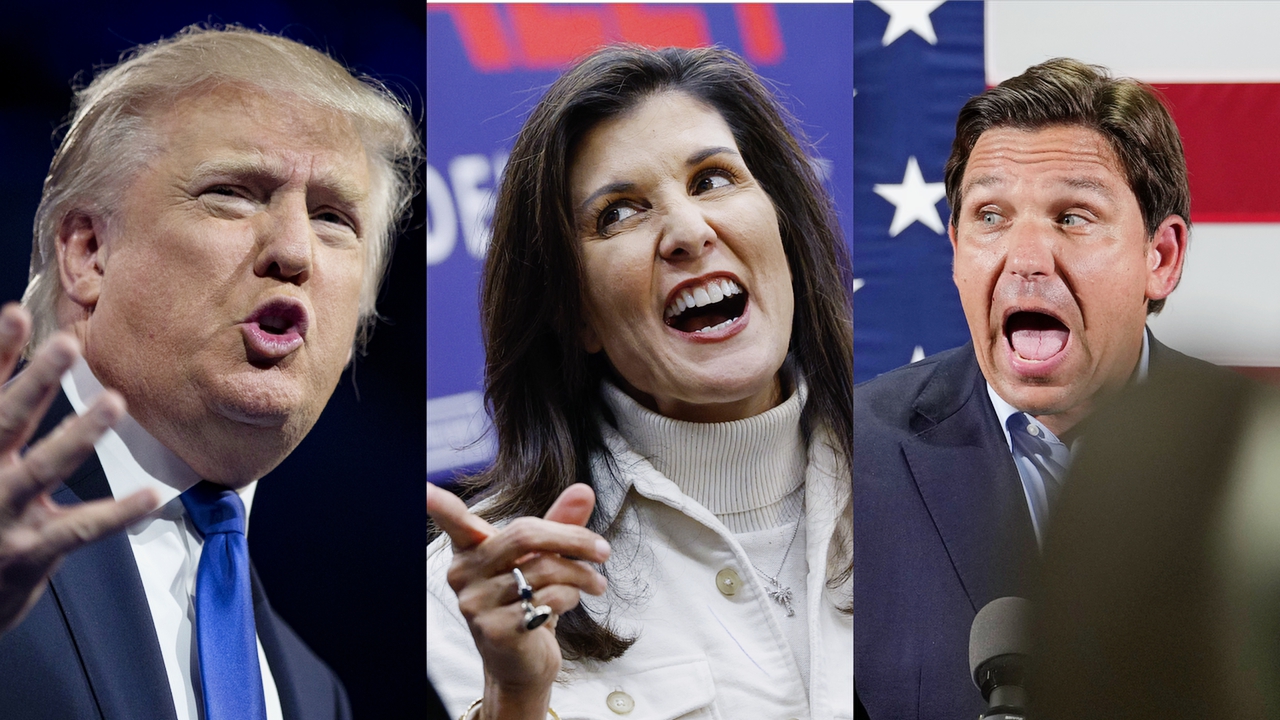Is Nikki Haley or Ron DeSantis the Best Candidate to Take on Trump?

L: AP Photo/Manuel Balce Ceneta C: Jim Slosiarek/The Gazette via AP, File R: AP Photo/Lynne Sladky
With the Iowa Caucus just two and a half months away, the first leg of the Republican presidential primary is coming to a close.
The introductions have been made. The op-eds have been written. Two debates have been completed. And four criminal indictments have been leveled against the frontrunner.
Mike Pence became the herald of this new stage when he suspended his campaign over the weekend. “It’s become clear to me: This is not my time,” admitted Pence in a speech on Saturday.
If only more of his peers were so self-aware.
The last several months have been instructive. Only two candidates stand a chance of supplanting Donald Trump as the GOP standard bearer: Former U.S. Ambassador to the U.N. Nikki Haley and Florida Governor Ron DeSantis. No one else can win the nomination and it increasingly seems as though some of them — namely Senator Tim Scott (R-SC) and upstart Vivek Ramaswamy — don’t really want to.
Two conditions must be met if Trump is to be beaten.
One, more candidates must come to the sensible, unselfish decision Pence did.
Two, voters must decisively choose between Haley and DeSantis.
And both of these need to happen, fast.
No one but the candidates themselves have any control over the first condition, but the Trump-skeptical segment Republican primary electorate will be the ones to decide between DeSantis or Haley.
For those either believe Trump cannot win a general election or would be concerned to see him do so, the question of who would make the better president is of course relevant. But another is even more paramount.
That is: Who can beat him?
THE CASE FOR HALEY
In a word: Momentum.
When Haley made her candidacy official in February, she was a longshot. The ex-ambassador and former governor of South Carolina hadn’t had a role in public life in years, hadn’t held elected office for even longer, and seemed ideologically out of step with the party.
On the day she re-introduced herself as a potential commander-in-chief, Haley stood at 3.8% in the RealClearPolitics national polling average. Now’s she’s at 8.3%. That hardly makes her a juggernaut, but when you compare DeSantis’s slide from 30% to 12.6% over the same period, it looks a lot better.
This trend is even more pronounced in the early states. In Iowa, she’s gone from averaging 5.5% in mid-May to 11.5% now and tied DeSantis for second in a survey released by the Des Moines Register on Monday, though she still trails both him and Trump in the average.
In New Hampshire and South Carolina, meanwhile, Haley has vaulted into second place. In the former, she’s seen her numbers skyrocket from 6% to nearly 15%; and in the latter, she now boasts a 7% lead over DeSantis.
Haley’s success to date is attributable to her strong debate performances and her efforts to distinguish herself from the pack.
In both forums with the other candidates, Haley has represented herself well, showing the conviction and command of the issues necessary to be president.
Just as importantly, she’s already won her “lane” as the traditional, Reaganite conservative, consolidating many of the voters who might have been just as inclined to support Pence or Scott at the outset of the race.
That’s not only resulted in her rise in the poll, it’s given her opportunities to strike a clear contrast with both Trump and DeSantis on a number of issues, but most notably foreign policy.
If Haley were to emerge as the sole alternative to Trump, she would bring a proven ability to persuade into the cage match.
THE CASE FOR DESANTIS
In a word: Fundamentals.
Despite his slide, underlying polling still suggests that DeSantis is — as he has been for the better part of three years — best suited to shave Trump’s lead down to size.
The Register poll was doubtlessly a sign of Haley’s increasing strength, and it was reported on as such. But some of its less flashy findings still cut DeSantis’s way.
Even though the frontrunner has trained most of his fire on the Florida governor, DeSantis remains the second choice of 41% of Trump voters. Haley cleans up the next most at 16%.
Given the fact that Trump is presently sitting at 59% with the national primary electorate, it seems that the last candidate standing in his way will need to peel supporters directly away from Trump.
That case is bolstered not only by the numbers, but by DeSantis’s championing of a more populist platform that resembles Trump’s without being an exact replica. He also has the added benefit of an impressive record of legislative success and demonstrations executive leadership in Florida, some of which can appeal to both populist and traditional conservatives.
If DeSantis is able to edge out Haley, would her coalition really fail to coalesce behind DeSantis in order to stop Trump? The answer is almost certainly “no.”
Mathematically, then, he would almost certainly seem to be the best hope of anti-Trump Republicans.
THE STAKES
In spite of Trump’s standing in the polls, it is no inevitability that he reprises his role atop the GOP ticket. Just 27% of Republicans in Iowa and 23% of the same in New Hampshire have made up their mind about voting for the former president.
That’s plenty of runway for a Trump alternative to work with given the time and one-on-one race.
The problem is that while DeSantis has the best theoretical case for being able to take Trump on, Haley is the only one who’s proven she can move voters into her column.
So if there’s one thing to watch for from the two candidates in this second leg of the primary, it’s whether either can make the other’s strength their own.
This is an opinion piece. The views expressed in this article are those of just the author.
New: The Mediaite One-Sheet "Newsletter of Newsletters"
Your daily summary and analysis of what the many, many media newsletters are saying and reporting. Subscribe now!






Comments
↓ Scroll down for comments ↓